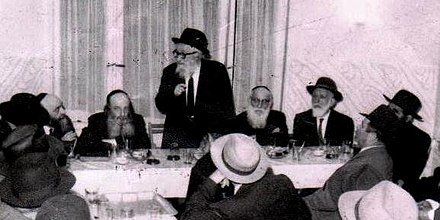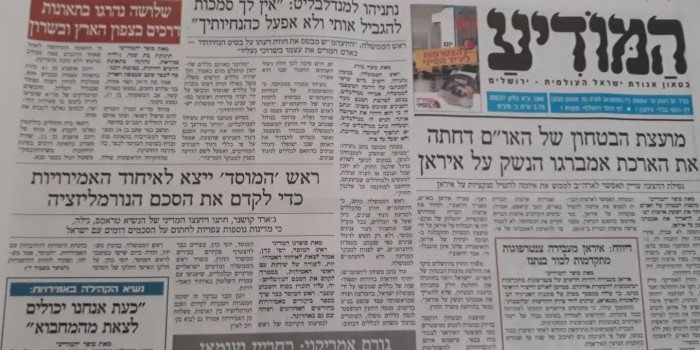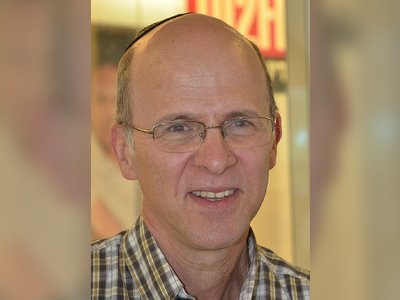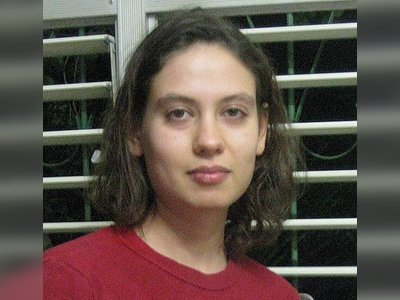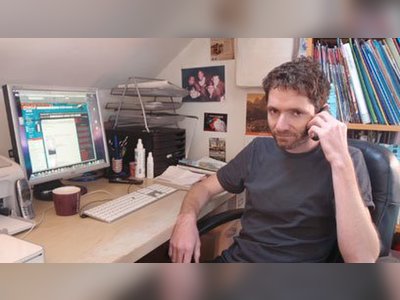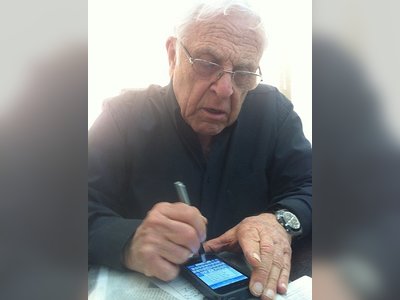מורשת גדולי האומה
בזכותם קיים
beta
David Zaritsky: The Life and Literary Legacy
David Zaritsky (Tishrei 5675, 1914 - 22nd of Sivan 5738, June 27, 1978) was a prominent Hebrew-Yiddish Haredi journalist, writer, poet, and editor. Born in Pinsk, Russia, to Asher and Shaindel, he grew up in Pinsk and briefly attended a branch of the Novhardok Yeshiva in the city, where he absorbed many of its teachings.
He later studied at the Radin Yeshiva and became a disciple of the Chafetz Chaim. During World War II, he spent time in Siberia. After the war, he moved to France, where he was involved in rescuing Holocaust survivors. During this period, Zaritsky published the anthology "Oysgetriknte Oygn" (Dry Eyes) in Paris. In the month of Sivan 5709, he made Aliyah to Israel and settled in Bnei Brak.
Zaritsky was one of the founders of the Haredi journal "Hamodia" and one of its talented writers. Despite his association with the Litvish (Lithuanian) Haredi community, he also contributed to "Di Yidishe Heim" (=The Jewish Home), a Yiddish women's quarterly and the Chabad women's magazine. Many of his short stories gained popularity in the Haredi youth press. His story "Shimke," which tells the tale of children during the Holocaust, was dramatized and performed in the schools associated with "Beit Yaakov."
Some of his works were published under the pseudonym Rabbi Y. Milstein, in memory of a close friend who perished in the Holocaust. At times, he used the pen name David Aynar (David Anonymous).
Zaritsky was married to Bertha (Bertie) nee Erlanger, and he passed away on the 22nd of Sivan 5738 (June 27, 1978) due to a heart attack, leaving behind his widow and four children. His son, Rabbi Yosef Zaritsky, is an expert in kosher certification. His daughter, Shaindel Einstein (known as Shoshi), is the founder and editor of "HaModia" women's magazine.
In the late 1980s, a street in the Ramot neighborhood of Jerusalem was named after him.
Selected works by David Zaritsky were republished in a revised edition by Yafeh Nof, Jerusalem, in 5768 (2008).
David Zaritsky's literary works were extensive in scope, encompassing Torah literature, fiction, and essays, primarily in Hebrew and Yiddish. Some of his Yiddish writings were translated into Hebrew.
He was known for his unique ability to infuse objects and abstract concepts with vivid imagery. His writings often conveyed a sense of intense emotion and sensitivity. He had a penchant for exploring complex ideas and concepts, often rooted in the teachings of the Chafetz Chaim and other Jewish sages.
Zaritsky's literary contributions were diverse, but he could be categorized into six main areas:
1. Literary Interpretation: Zaritsky was an interpreter of Jewish texts and teachings, drawing from various streams of Jewish thought. He sought to make these profound ideas accessible to a wide audience.
2. Yiddish Literature: He was a prolific Yiddish writer, composing short stories, essays, and poems. Many of his works were published in the Haredi press and catered to a religious audience.
3. Tales of Holocaust: Zaritsky's "Shimke" is one of his most poignant works, chronicling the experiences of children during the Holocaust. His writing served as a medium to preserve the memory of those dark times.
4. Moral and Ethical Writings: He wrote extensively on ethical and moral subjects, often in the form of essays and reflections, offering guidance based on Jewish tradition.
5. Educational Literature: Zaritsky was dedicated to the cause of education within the Haredi community. His writings, particularly in the "Beit Yaakov" school system, were aimed at instilling Jewish values and knowledge in the younger generation.
6. Communal Advocate: Zaritsky was a staunch advocate for the Haredi community's migration from urban centers like Jerusalem and Bnei Brak to more affordable towns. He believed in preserving the spiritual integrity of the community while ensuring its economic sustainability.
In his own words, Zaritsky saw himself as a commentator on the silent voices, deciphering the conversations of the mute and the growing. His writings were a means of understanding and interpreting the world through the lens of the Torah, Talmud, and Jewish tradition.
Moshe Prager, another writer, described Zaritsky's work as bearing the imprint of a mysterious spiritual world, a shadowy ethereality devoid of any corporeal substance, filled with an aura of nobility.
David Zaritsky's literary legacy endures as a testament to his unique ability to illuminate profound Jewish concepts through vivid, evocative language and storytelling.
Zaritsky was one of the founders of the Haredi journal "Hamodia" and one of its talented writers. Despite his association with the Litvish (Lithuanian) Haredi community, he also contributed to "Di Yidishe Heim" (=The Jewish Home), a Yiddish women's quarterly and the Chabad women's magazine. Many of his short stories gained popularity in the Haredi youth press. His story "Shimke," which tells the tale of children during the Holocaust, was dramatized and performed in the schools associated with "Beit Yaakov."
Some of his works were published under the pseudonym Rabbi Y. Milstein, in memory of a close friend who perished in the Holocaust. At times, he used the pen name David Aynar (David Anonymous).
Zaritsky was married to Bertha (Bertie) nee Erlanger, and he passed away on the 22nd of Sivan 5738 (June 27, 1978) due to a heart attack, leaving behind his widow and four children. His son, Rabbi Yosef Zaritsky, is an expert in kosher certification. His daughter, Shaindel Einstein (known as Shoshi), is the founder and editor of "HaModia" women's magazine.
In the late 1980s, a street in the Ramot neighborhood of Jerusalem was named after him.
Selected works by David Zaritsky were republished in a revised edition by Yafeh Nof, Jerusalem, in 5768 (2008).
Literary Legacy
David Zaritsky's literary works were extensive in scope, encompassing Torah literature, fiction, and essays, primarily in Hebrew and Yiddish. Some of his Yiddish writings were translated into Hebrew.
He was known for his unique ability to infuse objects and abstract concepts with vivid imagery. His writings often conveyed a sense of intense emotion and sensitivity. He had a penchant for exploring complex ideas and concepts, often rooted in the teachings of the Chafetz Chaim and other Jewish sages.
Zaritsky's literary contributions were diverse, but he could be categorized into six main areas:
1. Literary Interpretation: Zaritsky was an interpreter of Jewish texts and teachings, drawing from various streams of Jewish thought. He sought to make these profound ideas accessible to a wide audience.
2. Yiddish Literature: He was a prolific Yiddish writer, composing short stories, essays, and poems. Many of his works were published in the Haredi press and catered to a religious audience.
3. Tales of Holocaust: Zaritsky's "Shimke" is one of his most poignant works, chronicling the experiences of children during the Holocaust. His writing served as a medium to preserve the memory of those dark times.
4. Moral and Ethical Writings: He wrote extensively on ethical and moral subjects, often in the form of essays and reflections, offering guidance based on Jewish tradition.
5. Educational Literature: Zaritsky was dedicated to the cause of education within the Haredi community. His writings, particularly in the "Beit Yaakov" school system, were aimed at instilling Jewish values and knowledge in the younger generation.
6. Communal Advocate: Zaritsky was a staunch advocate for the Haredi community's migration from urban centers like Jerusalem and Bnei Brak to more affordable towns. He believed in preserving the spiritual integrity of the community while ensuring its economic sustainability.
In his own words, Zaritsky saw himself as a commentator on the silent voices, deciphering the conversations of the mute and the growing. His writings were a means of understanding and interpreting the world through the lens of the Torah, Talmud, and Jewish tradition.
Moshe Prager, another writer, described Zaritsky's work as bearing the imprint of a mysterious spiritual world, a shadowy ethereality devoid of any corporeal substance, filled with an aura of nobility.
David Zaritsky's literary legacy endures as a testament to his unique ability to illuminate profound Jewish concepts through vivid, evocative language and storytelling.
- דוד זריצקיhe.wikipedia.org
